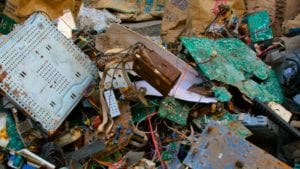 Recyclers and producers of electrical appliances will benefit the most from the increasing volume of electrical and electronic scrap worldwide in the future industry experts told the International Electronics Recycling Congress.
Recyclers and producers of electrical appliances will benefit the most from the increasing volume of electrical and electronic scrap worldwide in the future industry experts told the International Electronics Recycling Congress.
The congress, which was held in Austria recently, brought together industry leaders to discuss all aspects of electronic waste recycling – from current market developments and new technological trends to new legal frameworks and specific country reports.
Stephan Schwarz (ALBA International Recycling), Professor Jinhui Li (Tsinghua University, China), Stuart Fleming (EnviroServe) and Steve Skurnac (Sims Recycling Solutions) took part in a panel discussion aimed at answering the question: Who benefit the most from the increasing volume of electrical and electronic scrap worldwide in the future.
Technology and waste volume winners
According to Stephan Schwarz the e-waste market has become very dynamic and the classic recycling strategy of recovering valuables, mostly metals, will no longer work. Instead, new recycling technologies and increasingly automated processes are needed. However, it is not only important for the right technology, but also for access to sufficient waste volumes.
“Those who can meet both these requirements have a good chance of being among the winners in the e-waste market,” he added.
OEMs to lead the way
Stuart Fleming and Professor Jinhui Li took a different view of things. They both expect the producers of electrical appliances or Original Equipment Manufacturers to among the winners. But only on the condition that they are clever enough to take over e-waste recycling companies so that they can harvest the raw materials at reduced rates.
Partnerships will reign supreme
According to Steve Skurnac the ever increasing volumes of e-waste present both opportunity and risk for recyclers and producers alike.
“Ever changing material composition and shrinking product size coupled with higher collection costs means that e-recycling will become much more local in many jurisdictions,” he explained. In countries without well-developed regulations or collection mechanisms this means that recyclers will need to put in significant resources to help develop the markets.
In more advanced regions the declining material value and smaller products suggest more hands on processing rather than larger mechanical solutions for initial material sourcing.
“The future winners will be companies that partner effectively with the entire circular supply chain to optimise collections, efficiently process material and find sustainable homes for the recovered commodities”, he said.
 Recyclers and producers of electrical appliances will benefit the most from the increasing volume of electrical and electronic scrap worldwide in the future industry experts told the International Electronics Recycling Congress.
Recyclers and producers of electrical appliances will benefit the most from the increasing volume of electrical and electronic scrap worldwide in the future industry experts told the International Electronics Recycling Congress.





